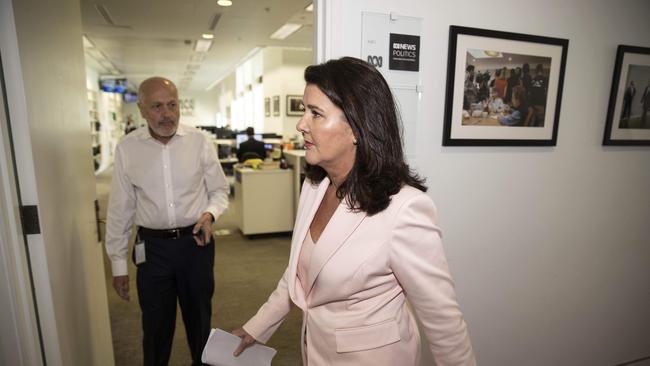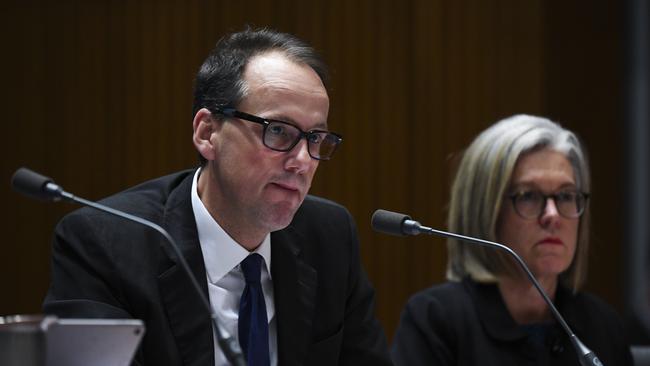
The government’s retirement income review said the present 9.5 per cent rate is enough to meet the scheme’s purpose and instead more focus should be on the income side of the scheme.
The betting is the government will let the proposed increase to 10 per cent on June 30 proceed but will change policy on the remaining 2 per cent, with one possible change being to give people a choice between taking the income as regular wages or as super.
This could be announced as policy in the May budget but not legislated until after the next election, which means if the government is returned it can claim a mandate for the change.
When the guarantee started in 1991 it was seen by the ACTU at the time as being a quasi wage rise, so if the government proceeded with an increase to 12 per cent but gave people a choice between wages or super then the original goals would hold.
The argument now says super is coming at the expense of wages, which is a big ask given anyone expecting a wage hike any time soon is dreaming.
If the government is intellectually honest it would simply draw a line in the sand at 10 per cent and say that is it.
Future super reform would then focus on issues like making the system gender-neutral by protecting female contributions when they are on maternity leave.
The main problem with the “Your future, your super” reform was in the ministerial discretion given in the “best financial interests of members” provision, which effectively allows the minister to intervene in the investment process. That’s plain wrong. Far better to let members decide and funds compete on returns.
At a time when the better funds are posting year-to-date returns of 13 per cent, now is not the time for governments to intervene.
Cheap power for Alcoa
Alcoa’s 500 jobs at its Portland smelter in Victoria have once again proved an extraordinary lever to get taxpayer funds into its pocket, with Canberra and the Victorian government agreeing to invest $19.2m each in a new four-year electricity deal.
AGL says it will only have 50 per cent of the new supply agreement for roughly 500MW in power, with Origin supplying about 35 per cent and Alinta 15 per cent.
The incumbent AGL has obviously tired of cut-price Alcoa deals so the load is being shared at what are claimed to be independent prices!
Based on the present spot price of $40/MWh this puts the deal at $175m, with taxpayers kicking in just under $40m, meaning Alcoa is paying $135m a year.
The last contract was reached around the time the Hazelwood power station closed in a hurry, sending spot prices as high as $90/MWh before settling around $70.
If you assume the Portland contract was at around $60/MWh that means Alcoa is getting some very cheap power — at least 33 per cent below last time.
The deal with the three companies would be lower than the spot price, so the actual price would be much cheaper.
In return for the $154m in taxpayer subsidies, Alcoa, it must be noted, has agreed to be flexible and cut its consumption at peak periods when the grid is under pressure.
The smelter, which accounts for about 10 per cent of Victoria’s power, will be a big user when wind and solar is at a surplus through the likes of the Origin Stockyard Hill wind farm in western Victoria, which is in the line waiting to be commissioned.
Shipton sidelined

Business as usual at ASIC with the chairman sitting on the sidelines was the order of the day in yesterday’s Senate hearings, highlighting James Shipton’s questionable return to the job.
Shipton opened the day with full and frank disclosure and appropriate acknowledgments to his fellow commissioners and staff, and then was largely an onlooker.
As might be expected, his deputy Karen Chester co-ordinated responses to the senators’ questions and the relevant commissioners spoke to their briefs.
It was no surprise Shipton was out of touch, given he stepped aside from the job last October and didn’t resume until February 2, with the absence used to defend his position in getting taxpayers to fund his tax advice.
An independent investigator cleared Shipton and former deputy Daniel Crennan of any wrongdoing.
Still, it makes you wonder what Shipton was thinking when he agreed to Treasurer Josh Frydenberg’s offer to return to his job pending the appointment of a new full time chair.
It was always going to look like a lame duck appointment and it was made to look so yesterday.
One potential candidate, Margaret Cole, was taken out of the process when she, as expected and noted here in January, was appointed to the vacancy left at APRA with Geoff Summerhayes’ departure at year’s end.
Cole is a lawyer by trade who has worked most recently at PwC in London and before that in an enforcement role for the UK Financial Services Authority.
She is returning to Australia after her partner Graeme Cooke was appointed chief vet in Victoria.
Austrac boss Nicole Rose was mentioned as a potential candidate but her star has dimmed somewhat after recent mistakes at the financial regulator.
Frydenberg has said he wants to fill the post by the end of April, so time is getting on.
Shipton said he would be happy to stay as long as required.
Chester has said she is interested in the job and a casual look at yesterday’s proceedings would indicate she is across her brief and well equipped.
Frydenberg also has a decision looming on who will be the oversight person for both APRA and ASIC, which will have a key impact on both organisations if the choice is someone who wants to be more than a seat warmer.
Yesterday’s issues at hearings included progress on directors’ insurance costs, Clive Palmer’s lawsuits and a waiver for small business on any delays in reaching new arrangements for business interruption policies.
Chester also rejected blame for delays on remediation payments to customers by the banks, with CBA and others going slow.
She told the committee $1.4bn was paid to customers wronged and $3.6bn remained outstanding.
ASIC talked up its risk and data exercise with former NBN executive Zack Gordon the chief risk officer and former Bupa staffer Scott Barber the data guru.
Chester said Google had helped the corporate plod work out how dodgy planners find their target customers on its platform.







This week’s delay in the government’s superannuation reforms highlights the tortuous process of change. The industry is expecting a two-stage process for changing the super guarantee, which is legislated to increase to 12 per cent in 2025.